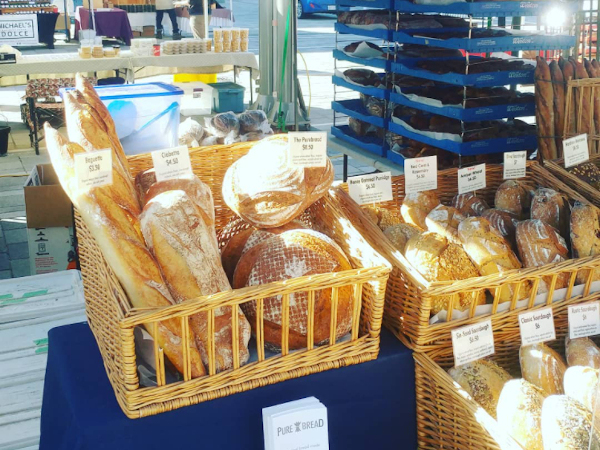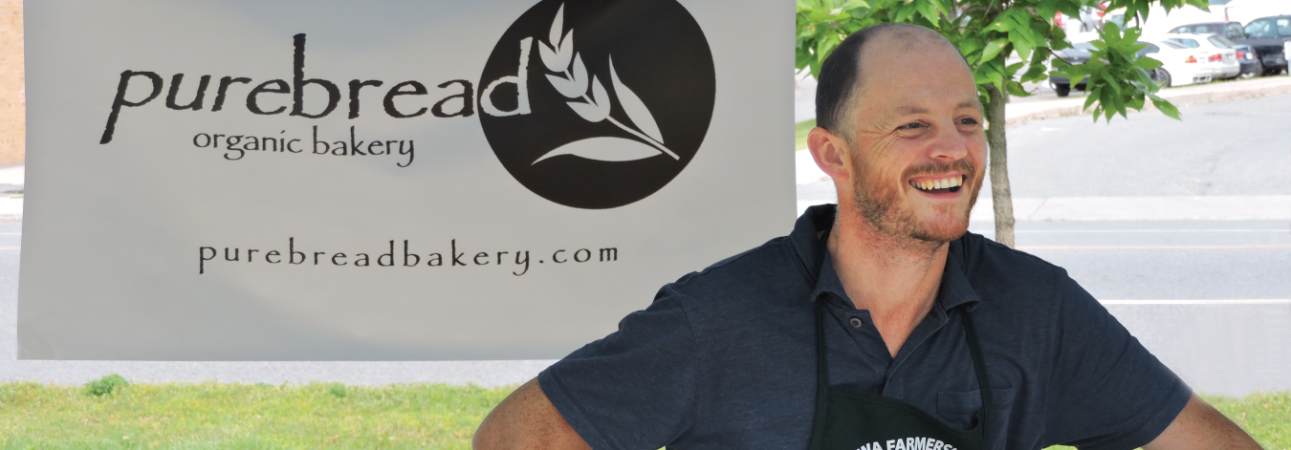When the COVID-19 pandemic hit Ottawa in early spring, the vendors at Ottawa’s many farmers markets scrambled to find new ways to get their product to customers. Andy Lofthouse, the Edinburgh-born owner of Purebread Bakery, found his pivot online. Using background skills in web editing and with the support of other local businesses, Lofthouse ensured that the ovens at Purebread kept firing.
Pre-pandemic Purebread
Lofthouse began baking as a hobby. Working at home in Scotland, he would use his downtime to bake bread.
“I got really sort of obsessed with it, doing it several times a week, to the point where I was enjoying that a lot more than the job I was being paid for,” says Lofthouse.
When he and his wife decided to move to Canada in 2013, Lofthouse saw a perfect opportunity to try and turn his passion into a business. He spent the next few months taking a course on the business aspects of running a bakery. Shortly after moving, Lofthouse launched Purebread out of his home kitchen.
When Purebread outgrew his home kitchen, Lofthouse searched for a new production facility. He initially used the kitchens of local restaurants after hours. He also rented the basement kitchen at the Centretown United Church for a brief period. Purebread eventually found its permanent home in Ottawa’s east-end industrial park. There, Lofthouse has both the space to work and store all his bread.
I got really sort of obsessed with it, doing it several times a week, to the point where I was enjoying that a lot more than the job I was being paid for.
Andy Lofthouse, purebread
Lofthouse sells most of his bread during the summer at the Westboro and Orleans farmers markets. He also sells year-round at the Lansdowne market to maintain a business presence in the community. For him, choosing to sell at the market was a matter of efficiency.
“The business for most of the vendors has grown at most of the markets, they’ve really been thriving,” says Lofthouse. “I’d be running three markets a week, which is kind of the equivalent of having a prime retail store open at different locations around the city three days of the week.”
Lofthouse mostly sells all-organic sourdough breads. He caters to customers looking for a premium local product, and by selling at the market, he cuts costs while reaching his target customers. “With the farmers markets, you don’t have any of the overheads that you have running a retail store, say on Bank Street or that sort of thing where you’re having to pay thousands of dollars a month in rent before you even turn the lights on,” he says.

Moving online
Lofthouse responded to temporary market closures by taking a week off to assess his options and rest. “It was just a matter of trying to think, ‘How do I make sure that my business can survive until we’re in a position to try and get back to some sort of normal way of doing business?’” says Lofthouse. He settled on developing an online curbside pickup system, which was realized with the help of other neighbourhood businesses.
Lofthouse had prior experience in web design, which he used to work on the online component of his new pickup system.“ I took a week to completely redesign my website and change it from being something that was purely an informational site to a site that had an online store,” he says.
It was just a matter of trying to think, ‘How do I make sure that my business can survive until we’re in a position to try and get back to some sort of normal way of doing business?’
Andy Lofthouse, purebread
While Lofthouse prepared his web store, the local business community reached out. Liz Mok, the owner of Moo Shu Ice Cream & Kitchen on Bank Street, offered her storefront as a temporary pickup location.
“We reached out to Andy saying, ‘Hey, if you needed a place just to start selling your bread right now, while you’re still figuring out what you’re going to do long term, you’re welcome to come and sell your bread here,” says Mok. For her, it was about buying Lofthouse the time he needed to re-establish his business.
“I started at the farmers market,” says Mok. “We wanted to make sure that those vendors were still going to survive through the pandemic as well.”
More local help
After collaborating with Mok for around two weeks, Lofthouse finished designing his web store. Octopus Books on Third Avenue became his new pick-up headquarters. Lofthouse was offered the location as a pick-up destination by owner and friend Lisa Greaves. “She’d been forced to close her business as well during the pandemic,” says Lofthouse.
While working with Moo Shu and Octopus Books, Purebread joined a delivery network launched by fellow market vendor, Paul Foster, owner of Poppa Bean Coffee Roastery. Lofthouse’s bread was delivered alongside other locally produced food products like cheeses and meats. Delivery wasn’t a great success for Lofthouse as there wasn’t enough demand to outweigh production costs. “Even though that wasn’t as financially viable for me, it was still a good way to keep connecting with customers,” he says.
To Lofthouse, the delivery network was about keeping vendors and customers connected: “The whole reason the farmers market works well is that the market ends up being much more than the sum of all its members,” he says.
Markets and community
Chris Penton, owner of the Beechwood Market, takes a similar perspective on the community aspect of markets. Like Lofthouse, Penton transitioned his market to curbside pickup and delivery systems, but he made it clear that on-site interaction at the market is one of its selling points.
I think the hunger to show up on-site is never going to go away.
Chris Penton, BEECHWOOD MARKET
“I think the hunger to show up on-site is never going to go away,” says Penton. “[The customers] want to show up. They want to talk to the vendors here about how things are growing.”
Lofthouse began selling his bread on-site as pandemic restrictions eased and markets reopened. Despite new challenges like mandatory mask policies and limited crowd sizes, Lofthouse is happy to be interacting with his customers again.
“I’m able to have that personal relationship with my customers, which they really value,” says Lofthouse. “When you’re actually interacting with the people who you’re doing business with, it just makes the whole thing much more enjoyable.”
